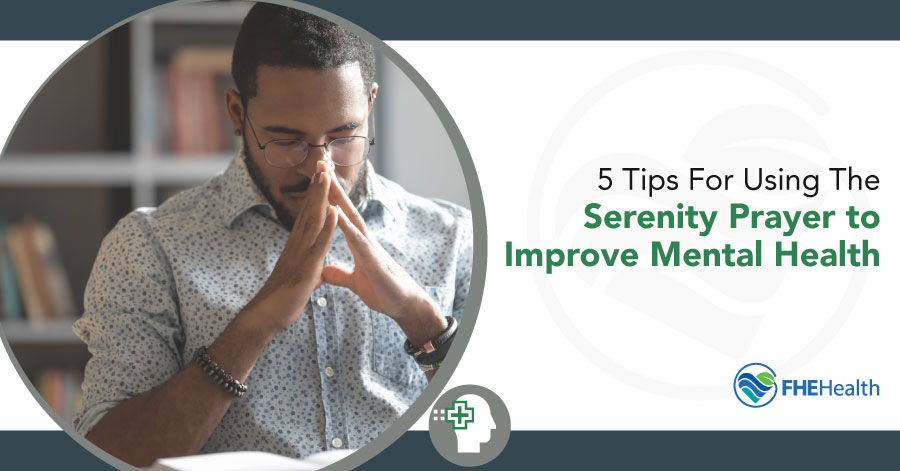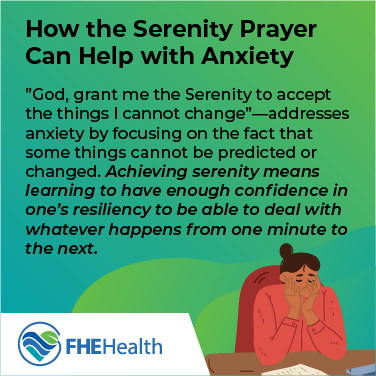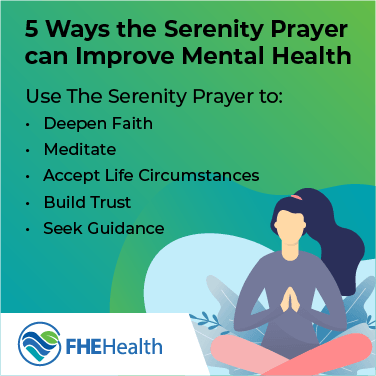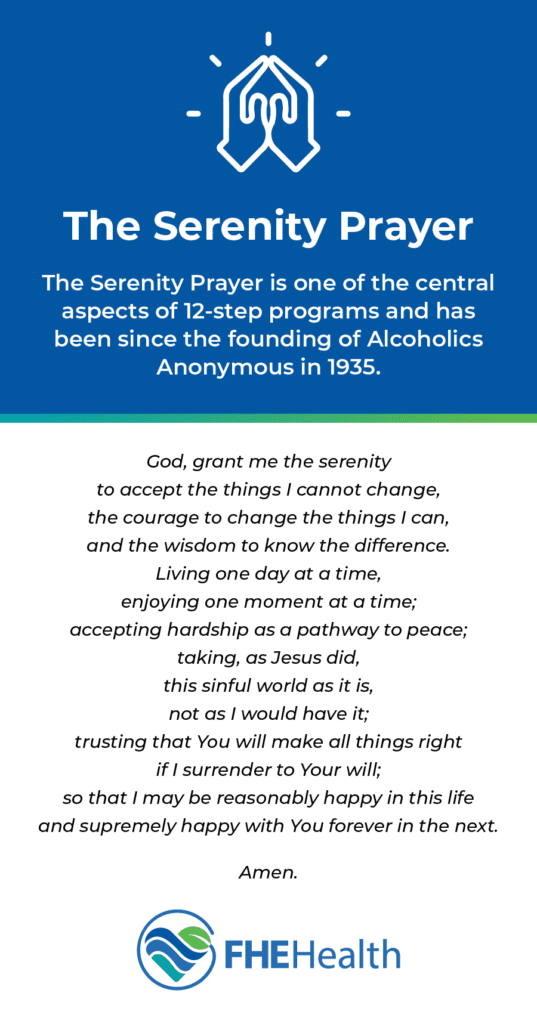
The Serenity Prayer is a common tool in the fight against addiction, serving as a central resource for those in 12-step programs of all kinds. Even for those who aren’t religious, this prayer can offer the guidance necessary to accept addiction and make meaningful steps toward recovery.
However, the prayer isn’t exclusive to addiction treatment, despite the common associations. In reality, this prayer can be a key part of recovering from any kind of challenging circumstances in life, and that includes mental health. With a guiding message intended to inspire hope, faith and resilience, this prayer can help those in need make decisions for the better.
There are many different ways to approach treatment for mental health. For some people, improvement comes from counseling or medication. But for others, it’s the Prayer for Serenity at work, helping guide the healing process.
What Is the Serenity Prayer?
The Serenity Prayer is one of the central aspects of 12-step programs and has been since the founding of Alcoholics Anonymous in 1935. The 12 steps, including the use of Serenity Prayer meditation, has proved to work, too, with higher rates of sobriety among those who have attended 12-step programs and adhered to the steps.
The prayer itself was written by American theologian Reinhold Niebuhr in the 1930s. Today, it’s highly recognizable, even among those who are not religious. While there are different versions of the Serenity Prayer available, the most commonly used form reads as follows:
God, grant me the serenity
to accept the things I cannot change,
the courage to change the things I can,
and the wisdom to know the difference.
Living one day at a time,
enjoying one moment at a time;
accepting hardship as a pathway to peace;
taking, as Jesus did,
this sinful world as it is,
not as I would have it;
trusting that You will make all things right
if I surrender to Your will;
so that I may be reasonably happy in this life
and supremely happy with You forever in the next.
Amen.
The Meaning of The Serenity Prayer
Niebuhr incorporated four virtues in his prayer: wisdom, courage, serenity and acceptance. As an ethicist, Niebuhr relied on writings by the ancient Greek philosopher Aristotle and the teachings of Jesus when determining the most helpful virtues to include in his prayer.
At its core, the fundamental meaning of the Serenity Prayer has to do with the ability to “let go of a situation that one cannot control and take deliberate actions in relation to the things they can control.”
For decades, members of 12-step programs like Alcoholics Anonymous and Narcotics Anonymous have used the Serenity Prayer as an aid in recovery. More recently, people who live with mental health disorders have also adopted this prayer as a way to help them cope with their condition and its symptoms and challenges.
The most important aspect of the Serenity Prayer for those seeking a brighter future is stated in the first four lines. This central message encourages those facing tough circumstances to accept that there are some things that can’t be changed and many others that can be, and that understanding the difference can be key to overcoming challenges. While this is commonly applied to addiction and the assumption that there are ways to change behavior for the better, the same principles can be applied to mental health.
Some 12-step programs are critiqued for a heavy reliance on the Christian faith, but the Serenity Prayer is often presented as a mantra, rather than a true prayer, for those who aren’t religious. Those of other faiths or who don’t believe in a higher power are encouraged to interpret mentions of God as a reference to the universe or fate.
How to Use the Serenity Prayer for Mental Health Needs
For those who find peace in religion, prayer and mental health can be intrinsically linked. Believing in something bigger than oneself can help individuals find peace and acceptance that may otherwise be missing. These kinds of feelings can help those living with mental health challenges to ultimately accept their circumstances and strive for a better, healthier future.
These five tips can help those with mental illness improve their mental health using the Serenity Prayer.
How the Serenity Prayer Can Help with Anxiety
 The Merriam-Webster dictionary defines “serenity” as “the state or quality of being serene.” Likewise, the definition of serene is “suggestive of quietude, unruffled repose and utter calm.”
The Merriam-Webster dictionary defines “serenity” as “the state or quality of being serene.” Likewise, the definition of serene is “suggestive of quietude, unruffled repose and utter calm.”
Serenity is the exact opposite of anxiety. Feeling anxious or struggling with a panic attack drags a person out of the present and into a state of fear, worry and misery. Racing thoughts control one’s emotions, while the physical effects of anxiety and fear fuel even more distressing thoughts.
People feel anxious for a variety of reasons–an upcoming job interview, a sickness in the family, or moving to another state. But this type of anxiety is temporary and normal. Once the situation passes, the anxiety tends to dissipate.
For people with anxiety disorders, that feeling of dread and worry never diminishes. They live in a constant state of fear because they view the world as unpredictable, dangerous and uncontrollable. The first line of The Serenity Prayer—”God, grant me the Serenity to accept the things I cannot change”—addresses anxiety by focusing on the fact that some things cannot be predicted or changed. Achieving serenity means learning to have enough confidence in one’s resiliency to be able to deal with whatever happens from one minute to the next.
How the Serenity Prayer Can Help with Depression
Like anxiety disorders, depressive disorders can often develop from a convergence of multiple events over time. Psychological or physical trauma, genetics, chronic stress, and brain chemical imbalances are some of the events leading to major depression. Depression causes people to see the world in a rigid, “black or white” perspective, where positive events are erroneously viewed as negative and a heavy sense of hopelessness constantly clouds their thoughts.
Many people with anxiety may be depressed, but their symptoms can conceal the symptoms of depression. For example, a person with a generalized anxiety disorder may not seem depressed to others, because they appear hyperactive and abnormally aroused by their anxiety. Emotionally, however, they may feel sad, pessimistic, and exhausted from worrying about the future while not letting others know how they feel.
“Courage to change the things I can” is one line from The Serenity Prayer that can help with depression. It refers to the ability to change something that you and you alone can take responsibility for, by seeking treatment.
Everybody possesses the capacity to tap into their inner “lion.” Learning how to overcome fear of inaction is the hardest part of pulling yourself out of depression. In addition to reading The Serenity Prayer and applying it to all aspects of your life, here are some tips for taking those first steps towards finding the courage to conquer depression and anxiety:
- Cultivate relationships with friends and family. Loneliness and isolation exacerbate depression.
- Don’t be afraid to reach out and talk to loved ones about your feelings.
- Maintain a steady pace of social activities, even if you may not feel like socializing. Don’t spend days by yourself in your apartment or house—get out and socialize!
- Seek out depression support groups for encouragement, advice and friendship.
- Volunteer your services with a non-profit organization.
- Exercise regularly with a workout buddy.
- If you don’t have a pet, think about getting one. Caring for an animal reduces depression, blood pressure and feelings of loneliness.
- Don’t expect perfection from yourself.
- Train yourself to stop negative thoughts as soon as you recognize them.
- De-stress and simplify your life as much as possible.
How the Serenity Prayer Can Help with Mental Illness
People with mental health conditions like depression, anxiety, panic disorder, and OCD can find a wealth of practical insights, inspiration and truth in The Serenity Prayer. For example, the sentence, “and the wisdom to know the difference,” means engaging in serious, internal dialogues in order to understand what can and cannot be controlled in life.
Wisdom is also one of the prayer’s virtues that refer to accepting responsibility for your actions, your thoughts and what occurs as a result of your actions and thoughts. Depression and anxiety can give rise to fatalistic perspectives which serve only to perpetuate negative thoughts and the false assumption that you are powerless against a harsh world that won’t let you change your life.
5 Ways the Serenity Prayer Can Improve Mental Health
 The Serenity Prayer is designed to embolden and galvanize individuals as they work to resolve their past and present problems. It is a liberating, optimistic prayer that can be a source of comfort regardless of what higher power you believe in. The message of hope, encouragement and confidence that it offers is universal.
The Serenity Prayer is designed to embolden and galvanize individuals as they work to resolve their past and present problems. It is a liberating, optimistic prayer that can be a source of comfort regardless of what higher power you believe in. The message of hope, encouragement and confidence that it offers is universal.
Use The Serenity Prayer to Deepen Faith
For those who find peace in religion, a deep connection to faith can be very important. Finding that faith is shaken can be a very difficult realization to confront, and it’s not uncommon for those with mental illness to struggle to maintain their faith. The Serenity Prayer speaks to accepting and enjoying life in service of a higher power, a message that can be very powerful for those looking to strengthen or revitalize a commitment to their faith.
Use the Serenity Prayer to Meditate
Meditation is a valuable tool for those from all walks of life. A way to clear the mind and reduce anxieties, meditation offers benefits to both mental and physical health. The Serenity Prayer meditation can allow individuals to isolate what really matters and take time to focus on acknowledging the reality of mental illness and building the strength necessary to make changes.
Use the Serenity Prayer to Accept Life Circumstances
The road to accepting mental health challenges can be a complicated journey. Many people find themselves living in denial, especially in the days and weeks following a diagnosis. The mantra “accept things I cannot change” can help those with mental illness accept the reality and shift focus to what can be done to better life circumstances.
Use the Serenity Prayer to Build Trust
While the first four lines of the Serenity Prayer are the best known, they’re not the only statements of value within the prayer. The line “trusting that You will make all things right” encourages the cultivation of trust, both in oneself and in a higher power. Focusing on how trust can play a role in recovery can help strengthen convictions and encourage individuals to take positive steps forward.
Use the Serenity Prayer to Seek Guidance
Overcoming mental illness often can’t be managed alone. Other people, from counselors to faith leaders, can play a role in encouraging wellness. With a prayer that encourages finding the courage to make changes, those living with mental illness can determine how to address treatment and who can best offer help.
Can the Serenity Prayer Work for You?
Seeing the Prayer for Serenity at work can be an excellent tool for some, but it isn’t right for others. Some forms of mental illness require professional intervention to properly address, and there’s no shame in that. Prayer, meditation and mental wellness exercises can only do so much, no matter how hard you try.
If you’re struggling to live with mental illness, FHE Health can provide the support and resources you need to approach recovery in a safe, healthy manner. Contact us today to learn more about our treatment programs.







